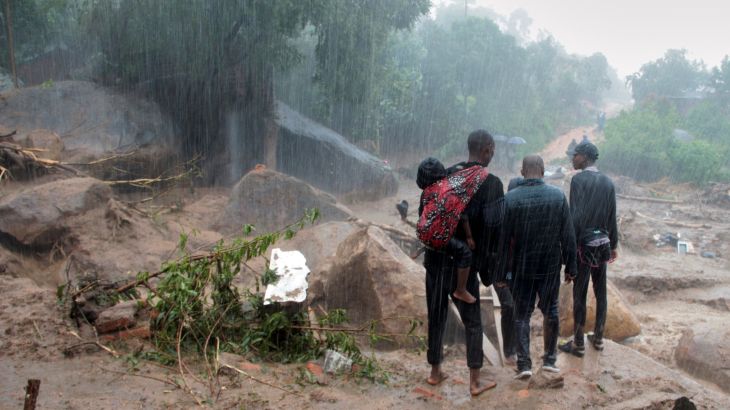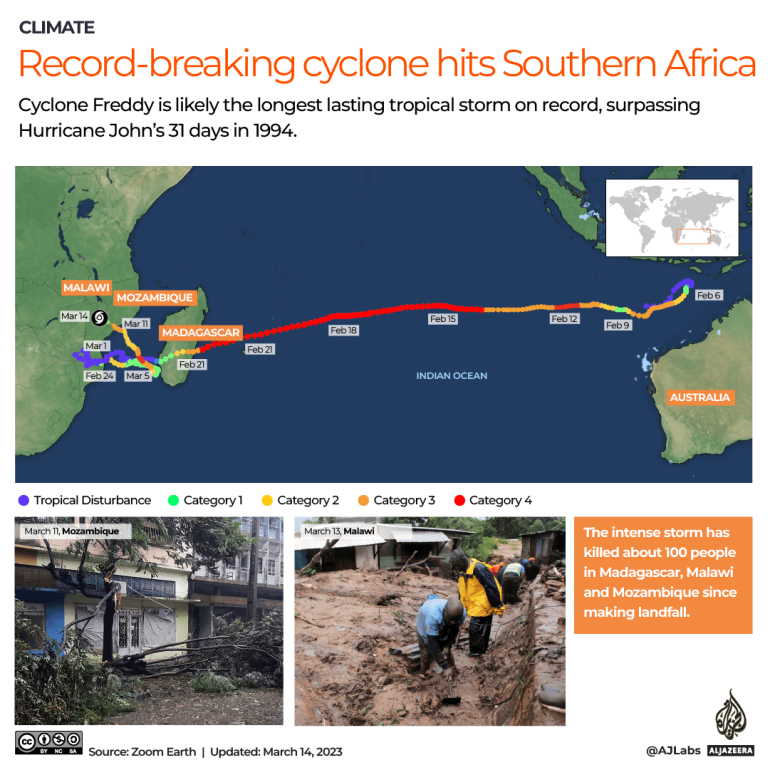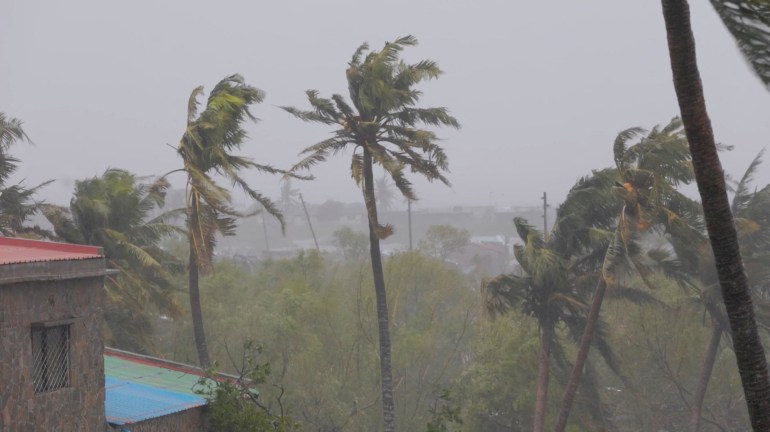Cyclone Freddy death toll in Malawi, Mozambique passes 100
With bare hands, Malawians dig through mud for survivors; Mozambique officials say fallout from the storm’s second landfall was worse than expected.

More than 100 people have been killed in Malawi and Mozambique after Cyclone Freddy, packing powerful winds and torrential rain, returned to Southern Africa’s mainland.
Freddy barrelled through Southern Africa at the weekend for the second time in a few weeks, making a comeback after it first hit in late February.
Keep reading
list of 3 itemsMauritius grounds flights as it braces for Cyclone Freddy
One dead as Cyclone Freddy lashes Mozambique for second time
Malawi bore the brunt, counting at least 99 deaths after mudslides overnight washed away houses and sleeping occupants.
Another 134 people were injured and 16 are reported missing. Malawi’s commercial capital Blantyre recorded 85 deaths.
“We expect the number to rise,” Charles Kalemba, a commissioner at the Department of Disaster Management Affairs, told a press conference on Monday.
In neighbouring Mozambique, at least 10 people died and 14 were wounded.
The Mozambique National Institute for Disaster Management said the fallout from the storm’s second landfall in the country was worse than expected.

According to the UN’s World Meteorological Organization, Freddy, which formed off northwestern Australia in the first week of February, was set to become what is believed to be the longest lasting tropical cyclone on record. It crossed the entire southern Indian Ocean and blasted Madagascar from February 21 before reaching Mozambique on February 24.
Following what meteorologists describe as a “rare” loop trajectory, Freddy then headed back towards Madagascar before moving once more towards Mozambique.
The last cyclones to cross the entire southern Indian Ocean were Leon-Eline and Hudah in 2000.
The UN said more than 11,000 people were affected by the storm.
The impact of the cyclone has piled more woes on Malawi, a country grappling with the deadliest cholera outbreak in its history, which has killed more than 1,600 people since last year.
President Lazarus Chakwera declared a “state of disaster in the Southern region” of the nation. The government was responding to the crisis while appealing for local and international aid for affected families, his office said.
Schools in 10 southern districts will remain closed until Wednesday, with rains and winds expected to keep battering the nation’s south.

National carrier Malawi Airlines said all flights to Blantyre have been cancelled until further notice after an inbound plane ran into the bad weather and was forced back to the capital, Lilongwe.
The country’s energy utility also warned that electricity generation would be unstable, as it would have to temporarily shut down hydropower stations to prevent muddy water from damaging turbines.
Armed with shovels or just their bare hands, residents of the southern Malawi township of Chilobwe were digging through the mud, hoping to find survivors as the torrential rain unleashed by Cyclone Freddy poured on their backs.
Government rescuers were late to arrive, said one resident refusing to give his name, covered in mud, as he helped with the rescue effort.
“The people are overwhelmed. The situation is very difficult,” said ambulance driver Honest Chirwa, adding rescuers lacked adequate equipment.
The impoverished township has been hit hard by the powerful storm, which triggered flooding and mudslides that swept away homes and buried their inhabitants.

Many of the Malawi deaths were in Chilobwe, a hillside settlement near Malawi’s second-largest city, Blantyre.
“There was a huge mudslide that dragged down several houses. It was bad,” said Donald Banda, a 16-year-old student. He is among about 100 residents searching for their neighbours, dead or alive.
The mudslide struck overnight and destroyed everything in its wake, Banda said, with several houses and their occupants disappearing almost instantly.
Most of the houses in the area are built with mud bricks, making them easily susceptible to damage under harsh weather.
“We have no choice but to do this all on our own,” said the man, who asked not to be identified by name. “It is frustrating because people are dying.”